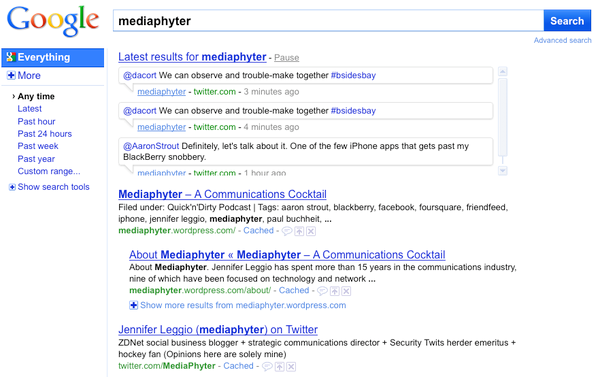Google real-time search + Twitter = a wake-up call for brands

Marketing and public relations people take heed: the game has changed.
Until today I admittedly hadn't thought too much about Google's real-time search and its impact on brands using Twitter. That all changed when Stuart Robertson of DesignMeme sent me a link to a blog post in which the author calls out potential examples of Google allegedly being used as a spam engine. Spam aside, the mixture of Twitter and Google's real-time search is a scary and uncertain reality for brands or, quite frankly, anyone who diligently watches his or her online reputation.
For example, take a look at this screen shot that Robertson sent me of my very own tweets popping up in Google real-time search:
Since I'm widely known as "mediaphyter" a Google search on my long-time nickname is now that much more revealing than it would've been only a week ago. Though I am pretty careful not to tweet anything that I wouldn't want seen by a much wider audience, not everyone is that careful. Suddenly, the ability to choose whether or not one wants to integrate his or her business and professional lives is gone.
This is already starting to scare some business-focused users, including Robertson, away from engaging as publicly as they once did.
"I'm finding I'm using the direct messages much more today for things I would have @replied to yesterday," he said.
Next: Brand management & spam -->
This isn't just about brand behavior; this is about brand management, too. The bigger issue at hand: reputation management for brands. Let's take Starbucks as an example. Most people tend to Google a location to pop up a Google Map rather than going to the brand of choice and tediously searching for the "find a location" page. That's my story whenever I travel and want to find a local Starbucks. Immediately, under news or ads, pops up a list of locations nearest where I happen to be at the time.
However, what if someone is ranting about Starbucks on Twitter? In the past a brand manager might respond with "Oh, that person only has 50 followers" and not be too concerned. Not so fast anymore, brand manager. That tweet will now be picked up on Google real-time search right above the location search. See, I did a test:
Pretty scary, huh? This could especially be terrifying in a crisis communications situation (Can you imagine a search for "Tiger Woods"?). It's not just consumer brands that can be impacted by this, either. What if someone is considering a purchase of a large firewall or doing competitive research for business intelligence software? One of the first steps might be to Google that company name, and if the searcher lands on a complaint he or she may never make it to the brand's Web site.
Beyond management and control, the slander and impersonation issues that brands have been facing on Twitter alone now also become much bigger. Not to mention the possibility of spammers using key words to try and push malicious links into real-time search from Twitter.
A spokesperson for Google says that the company has been considering these issues, and that it will continue to diligently review links and issues as it always has.
"In Google search, we use automated and manual processes to identify results appearing to be malicious and add warning labels to help protect users from compromised sites. The shortened links in real-time search are also automatically checked to detect sites that may be malicious, and those that can't be resolved to their full form will not be displayed. We will continue to improve and refine these systems, and also to help keep sites using bad SEO tactics out of our index."
Will Google real-time search change the way that you -- or your brand -- use Twitter?
